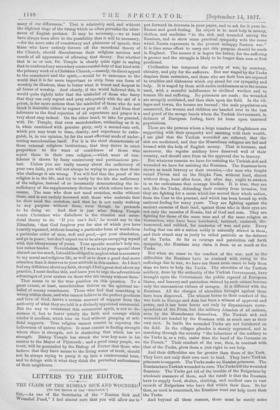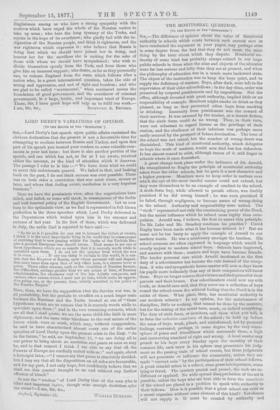LETTERS TO THE EDITOR.
THE CLAIM OF THE RUSSIAN SICK AND WOUNDED)
[TO THE EDITOR OF ma " OFECTATOR.1
Snt,—As one of the Secretaries of the "Russian Sick and Wounded Fund," 1 feel almost sure that you will allow me to put forward its interests in your paper, and to ask for it your in- fluence and good-feeling. Its object is to send help in money, clothes, and medicine "to the sick and wounded among the Russians, and to show some practical sympathy with the cause which Russia represents in the present unhappy Eastern war."
It is time some effort to carry out this purpose should be made in England. The sooner it is begun the better, for the suffering is greater and the struggle is likely to be longer than men at first predicted.
Civilisation has tempered the cruelty of war, by courtesy, chivalry, and pity for the sufferers. But war waged by the Turks despises these restraints, and those who are their foes are exposed to cruelties and dishonour which cry aloud for our sympathy and help. It is waged by them with entire recklessness as to the means
used, with a scornful indifference to civilised warfare and to human life and suffering. No prisoners are made ; the wounded are savagely mutilated, and then slain upon the field. In the vil- lages and towns, the houses are burned ; the male population are massacred, the women and children are handed over to the lust and greed of the savage bands whom the Turkish Government, in defiance of European feeling, have let loose upon unarmed populations.
These are the persons whom a large number of Englishmen are supporting with their sympathy and assisting with their wealth.
I am glad that the Turkish wounded are relieved, that the sick are medicined, and that the Mussulman refugees arc fed and housed with the help of English money. That is humane, and moreover, the regular soldiery have deserved well of their country, and should earn from us the approval due to bravery.
But whatever reasons we have for assisting the Turkish sick and wounded we have for assisting the Russians. The Russians have shown as much bravery as their enemies,—the men who fought round Plevna and on the Shipka Pass, without food, almost without sleep, hour after hour, day after day, ought to awaken in us the enthusiasm that courage kindles. It is true, they aro not, like the Turks, defending their country from invasion, but they are fighting for a cause which has moved their whole nation, from the Czar to the peasant, and which has been bound up with national feeling for many years. They are fighting against the ancient enemies of their land, against those who in their eyes are not only the enemies of Russia, but of God and man. They are fighting for those of the same race and of the same religion as themselves, who have been butchered, tortured, enslaved, dis- honoured, and robbed, for centuries of woe and pain. Every feeling that can stir a nation nobly is naturally stirred in them, and their attack may as justly be called patriotic as the defence of the Turks. So far as courage and patriotism call forth sympathy, the Russians may claim it from us as much as the Turks.
But when we come to the conduct of the war, and to the difficulties the Russians have to contend with owing to the sufferings due to war, we have ten times more cause to help them than we have to help the Turks. The atrocities of the Turkish soldiery, done by the authority of the Turkish Government, have brought upon the Government the public reproof of European States, and bravery and patriotism stained by such crimes become only the unconscious virtues of savages. It is different with the Russians. All the charges of atrocities brought against them have been disproved. The witness borne to their conduct of the war both in Europe and Asia has been a witness of approval and praise, and it has been borne not only by dispassionate corre- spondents of the Press, but the military Attaches of all nations, even by the Mussulmans themselves. The Turkish sick and wounded are tended by the Russians with as much care as their own men. In battle the wounded Turks are not butchered on. the field. In the villages plunder is sternly repressed, and in marching through the country "the behaviour of the soldiery to the Turks is, as a rule, easier than the hand of the Germans on the French." Their conduct of the war, then, in contrast witb. that of the Turks, gives them a just right to our help.
And their difficulties are far greater than those of the Turk. They have not only their own men to tend. They have Turkish prisoners to support. The Turks make no Russian prisoners. The Russianshave Turkish wounded to cure. The Turks kill the wounded Russians. The Turks get rid of the trouble of the Bulgarians by wholesale massacre of them, and the result is that the Russians. have to supply food, shelter, clothing, and medical care to vast crowds of Bulgarians who have fled within their lines. So far then, as need is concerned, the Russians want our help more than. the Turks.
And beyond all these reasons, there must be surely some
Englishmen among us who have a strong sympathy with the motives which have urged the whole of the Russian nation to take up arms ; who hate the long tyranny of the Turks, and rejoice in the hope of its overthrow; who gladly feel with the in- dignation of the Russian people, and think it righteous, and the war righteous which expresses it ; who believe that Russia is doing that which we should have joined her in doing, and honour her for the sacrifices she is making for the sake of those with whom we should have sympathised ; who wish to divide themselves openly from the Turk, and from those who give him an immoral support ; who desire, so far as they personally ORR, to redeem England from the curse which follows after a nation who, in a great international question, takes the side of wrong and oppression, and not of right and freedom ; and who are glad to be called "sentimental," when sentiment means the foundation of good government, and the overthrow of criminal government, in a large, fertile, and important tract of Europe. These, Sir, I have good hope will help us to fulfil our work.—































 Previous page
Previous page